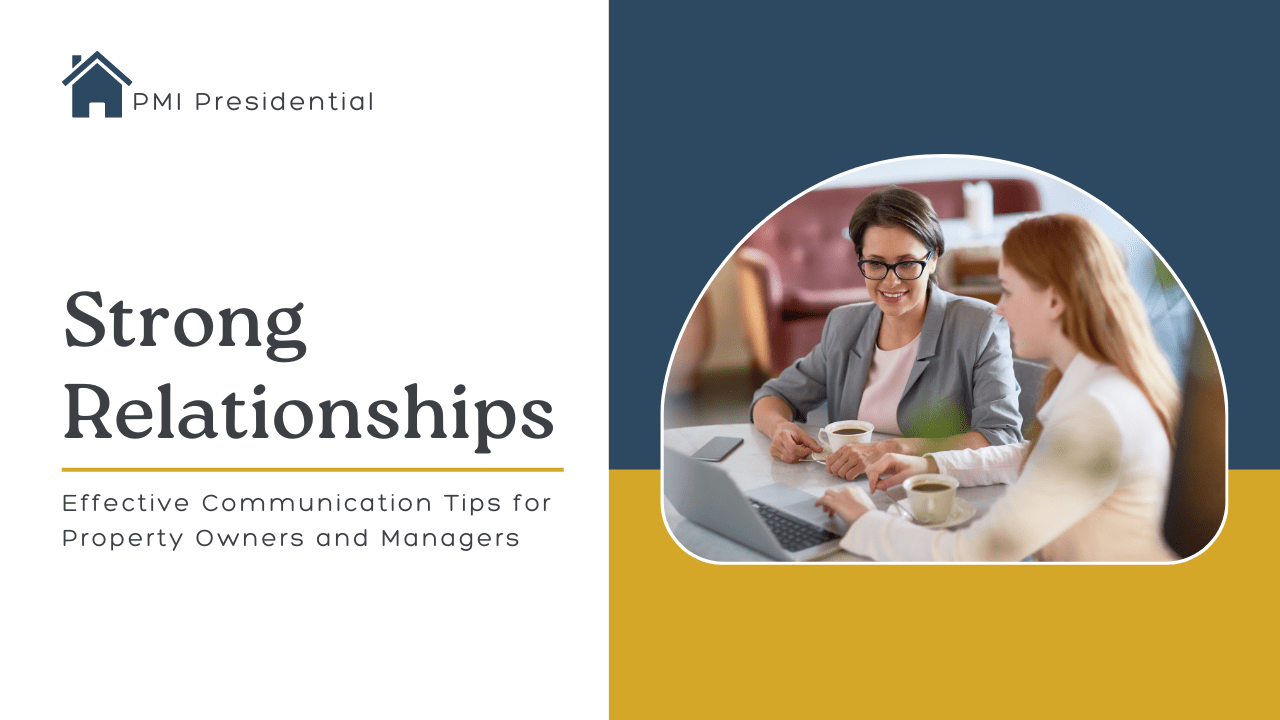Establishing and maintaining strong relationships with tenants is not just beneficial; it's essential for the success and sustainability of your investment property in Richmond. Effective communication is the foundation of any solid relationship, and when it comes to the landlord/tenant relationship or the property manager/tenant relationship, good communication ensures smooth operations and improved tenant satisfaction.
The impact of effective communication is pretty hard to miss. It bridges the gap between expectations and reality, minimizing misunderstandings and creating a foundation of trust. Good communication ensures that tenants feel valued and listened to, which significantly enhances their overall satisfaction and loyalty. For landlords and property managers, this can lead to higher retention rates, reduced vacancy periods, and a more stable revenue stream.
There’s also the matter of avoiding unpleasant situations like conflicts, disputes, and even evictions. By addressing concerns promptly and efficiently, it’s easy to prevent minor issues from escalating into costly disputes or legal battles, preserving the property's reputation and value in the competitive Richmond market.
Everyone loves a Top 10 list (right?), so here are our 10 best practical tips designed to enhance communication between property owners and tenants. This is how we stay on top of good communication and positive tenant relationships as your Richmond property management partner.
1. Set Clear Communication Channels
We have to start with knowing how to communicate. Do your tenants understand how to get in touch with you?
Everyone has their own preferred methods of communication. Thanks to technology, there are countless ways to communicate. Just remember that not all are effective or preferred in a rental context. When there’s a sudden leak or a maintenance emergency at your rental property, you can’t have your tenants sending you an @ on social media. You need a phone call.
Establishing clear, preferred channels of communication such as email, phone calls, text messages, or portals on your property management software will open up possibilities for you and your tenants. Let them know what the communication options are from the outset so that messages are received and responded to promptly. Make sure tenants know the best times to reach you for non-emergencies and how to proceed in case of an emergency.
As Richmond property managers, we’re fortunate to have invested in software that provides an online portal for both tenants and owners. It allows for convenient online rent payments, immediate maintenance requests in writing, and a messaging section that keeps us organized and accountable.
2. Be Proactive with Information
Always share information with tenants when they need it.
Whether it's routine maintenance, property inspections, or changes in rental policy, proactive communication can prevent misunderstandings and minimize tenant frustrations. Providing tenants and managers with advance notice about anything that may affect them not only demonstrates respect for their time and space but also helps build trust.
Don’t be afraid to share bad news, either. No one likes to tell tenants what they don’t want to hear, but trying to dance around the subject never works. Be direct. Be informative. Be prepared to talk about it.
3. Encourage Open Feedback from Richmond Tenants
Creating an environment where tenants feel comfortable sharing their feedback or concerns is important to a good relationship. It’s also part of healthy communication. We have an open-door policy for tenants, and we invite them to talk to us about what we’re doing well and what they’re struggling to work around.
Regularly invite tenants to voice their opinions on what's working and what isn't. This not only helps in addressing issues before they escalate but also in making tenants feel valued and heard. It also inspires better business practices. If you’ve had six applicants complain about the complications of your online application, for example, you want to listen.
4. Practice Active Listening
It’s not always easy to listen.
But, when a tenant reaches out with concerns, practice active listening. This means fully concentrating on what is being said rather than just passively 'hearing' the message. Acknowledge the issue, show empathy where appropriate, and work together to find a satisfactory resolution. Active listening can significantly enhance the tenant-owner relationship and lead to quicker problem-solving.
Sometimes, tenants just want to be heard. It’s possible they’re bringing you a problem that you cannot possibly solve. When you listen to them, though, they’ll feel validated and less alone. That’s good for your relationship.
5. Document Everything
While verbal agreements can be convenient and those face-to-face conversations can be refreshing, having a written record is invaluable, especially when disputes arise.
Follow up in-person discussions and phone calls with an email summarizing the key points of what was discussed and decided. This not only ensures clarity but also provides a reference point for future conversations. Additionally, make sure all official agreements, like lease terms and property rules, are documented and accessible.
We like to keep files and documentation both digital and printed. It minimizes the risk of not being able to access the information you need when you need it.
6. Stay Informed and Educate Your Tenants
Richmond’s rental market and property laws can be complex. The market is also always changing.
You have to be willing to stay up to date with all of it when you’re managing your own property. You also need to provide relevant information and resources to your tenants. Educating your tenant about their responsibilities is also important if you expect them to meet the requirements of their lease. Before they move in, have a discussion about rent collection, maintenance processes, and all of the rules and regulations that come with renting out your property.
7. Utilize Technology
Leverage technology to streamline communication and management tasks. Property management software can facilitate everything from rent collection to maintenance requests, making it easier for tenants to communicate their needs and for owners and managers to address them efficiently.
You may not have access to the depth of the technology that we use. Our recommendation is to either partner with a Richmond property management company so that all of the technology is available to you and it’s easier to enjoy a hands-off rental experience or invest in your own technology which is available to independent owners and investors with smaller portfolios.
8. Cultivate Personal Connections
Use all the technology that’s available to you, especially when your tenants appreciate it, but never underestimate the value of personal connections. Simple gestures, such as greeting cards during the holidays or a welcome note for new tenants, can go a long way in building a strong relationship with your renters. It’s thoughtful and appreciated. Whenever possible, personalize your interactions with tenants and anyone else you come into contact with, whether it’s a vendor or an applicant during a showing period. This can transform purely transactional relationships into more meaningful connections.
9. Resolve Conflicts Calmly and Constructively
Conflicts or disagreements can happen, even when you have a great relationship with your tenants. If there is a problem that arises, approach the issue (and your tenant) with a calm and constructive mindset. Your tenant might become emotional, especially if it’s a problem that disrupts their lives, but you have to remain professional.
Avoid placing blame and do not become defensive. Instead, focus on understanding the root cause of the conflict. Together, brainstorm solutions that address the concerns of all parties involved. Demonstrating a commitment to resolving issues fairly can strengthen trust and respect between landlords and tenants.
10. Offer Regular Updates and Reports
 Keep tenants and potential tenants in the loop with regular updates about the property and any changes in management policies or community guidelines. If you have a new refrigerator being delivered, for example, connect the tenant directly with the vendor to ease the scheduling of an installation. When a tenant requests new paint before moving in, let them know what you’ve decided and why.
Keep tenants and potential tenants in the loop with regular updates about the property and any changes in management policies or community guidelines. If you have a new refrigerator being delivered, for example, connect the tenant directly with the vendor to ease the scheduling of an installation. When a tenant requests new paint before moving in, let them know what you’ve decided and why.
Providing periodic reports on maintenance schedules, safety inspections, and upgrades not only keeps everyone informed but also shows your proactive approach to property management. Transparency in operations encourages a culture of openness and mutual respect.
With better communication and a commitment to stronger relationships, rental property owners can create an environment of trust and respect. Your attention to how you interact with your tenants will enhance the overall satisfaction and security of all parties involved.
Maybe it all seems like a bit too much. If you’re not sure that you have the time, interest, or resources to invest in solid communication strategies and good tenant relationships, you may want to consider partnering with a Richmond property manager. When you have a property management partner, you don’t have to worry about any part of the tenant relationship. Your property manager is taking care of everything for you, from the leasing to the correspondence, to the accountability. Many owners find that their management partner does a much better job with communication than they could.
Whether you talk to a property manager or continue taking care of things on your own, by incorporating these communication and relationship tips into your rental relationships, you can enjoy a better rental experience.
We can tell you more about how we communicate. Please contact us at PMI Presidential.


